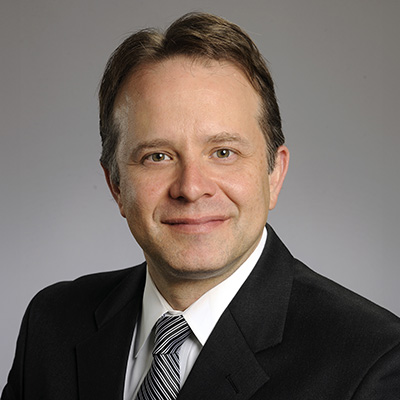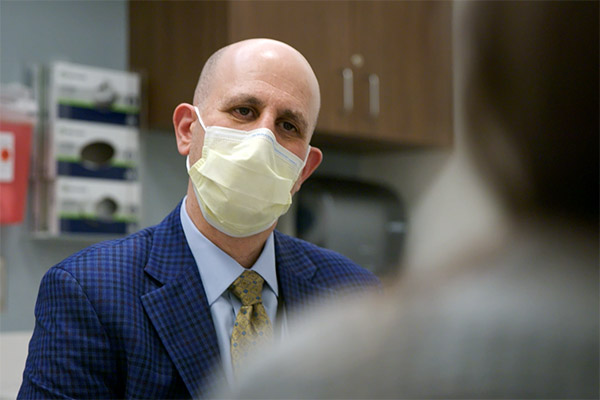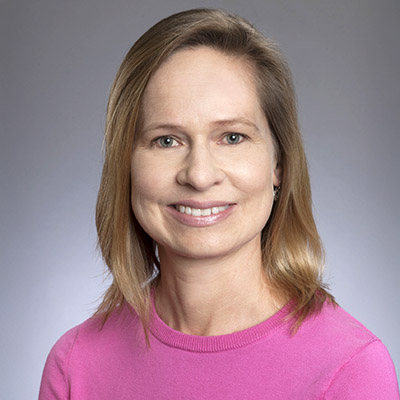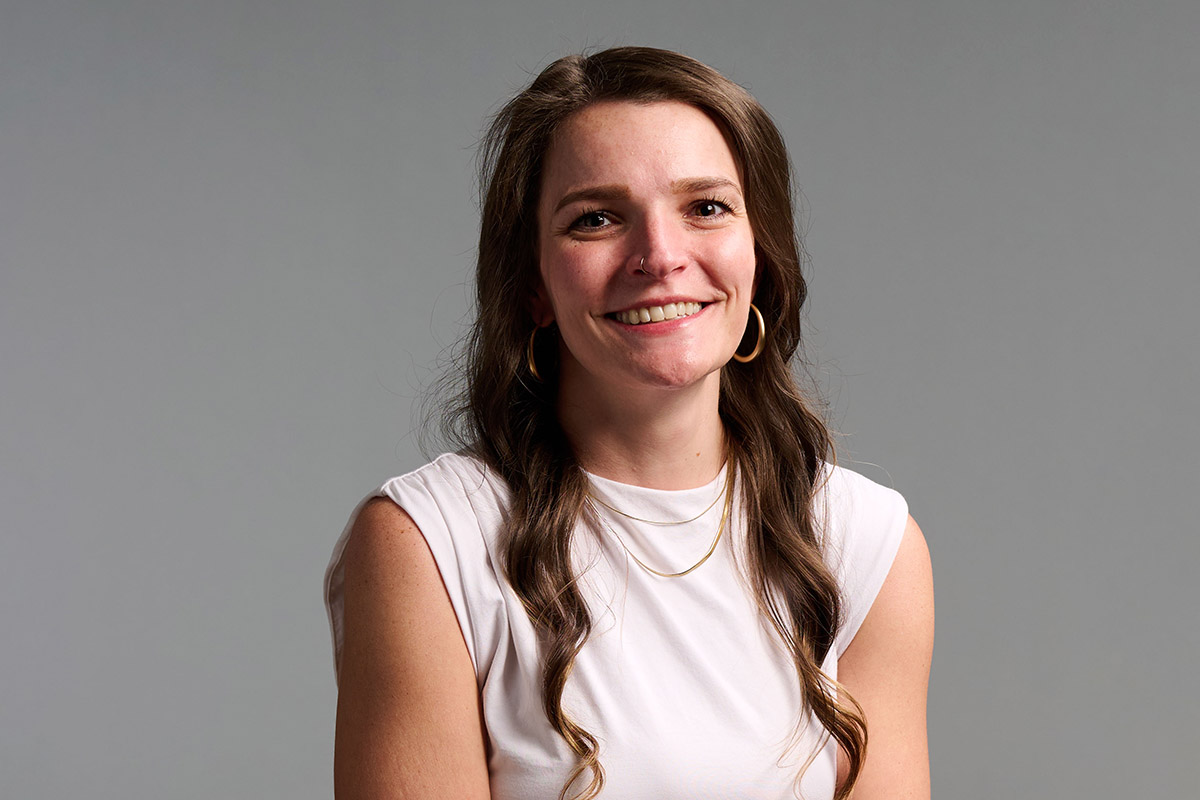Most of the time, this type of stomach cancer is caught very late and has already spread elsewhere in the body. So, I was extremely lucky and blessed to find it as early as we did.
Genetic testing led to successfully preventing invasive cancer
Ali never expected what she’d discover when she sought genetic testing for the BRCA1 and BRCA2 gene mutations, hoping to understand her own risk for breast cancer given her mother’s early diagnosis.
Although Ali didn’t have either of those gene mutations, she did have a mutation in the CDH1 gene. This meant she was at high risk of developing both stomach cancer and breast cancer. Hereditary diffuse gastric cancer (HDGC) is rare. The inherited cancer syndrome, caused by the mutated CDH1 gene, predisposes those with the gene mutation to developing invasive stomach cancer and lobular breast cancer.
Ali’s genetic counselors referred her to the physicians at Winship Cancer Institute of Emory University who would guide her through the next steps. “When I was hit with a diagnosis,” Ali says, “I did a good amount of research and discovered that Winship was the place for me, five out of five stars.”

Field F. Willingham, MD, MPH
Ali says she “obviously went to Google, like everyone else, and was immediately terrified.” She called her sister and mom, talked with her roommate and continued to do research with them. “I realized how serious it was. So, I was like, I need to take action because I would like to live a long, healthy life.” She asked, “How do we fix this? What do I need to do next? How can I prepare best?”
First was an endoscopy, a procedure in which the doctor looks inside the body through a long, thin tube with a camera inserted through one of the body’s natural openings, such as the mouth, urethra or anus. It was performed by Field F. Willingham, MD, MPH, director of endoscopy in the Division of Digestive Disease and professor in the Department of Internal Medicine at Emory University School of Medicine.
“Unfortunately, they did find a few spots of cancer,” Ali says, explaining that HGDC “grows in small little spots everywhere instead of as one large tumor.” In fact, they found 34 spots.
Before and after surgery
After the endoscopy, Ali at first thought she could wait to take further action. But then “all the research that I had done really kicked in and told me that I needed to make that decision [to have surgery] now because I didn’t know how fast it could move. I didn’t want it to move into other organs, and just hoped and prayed that it already hadn’t because we couldn’t tell that until they went in to do the surgery.”

David M. Kooby, MD, FACS, in an exam room.
Ali met with Winship surgical oncologist David M. Kooby, MD, FACS, director of surgical oncology at Emory Saint Joseph’s Hospital and professor in the Division of Surgical Oncology at Emory University School of Medicine. She says she felt fortunate to have found Kooby. “I knew that he was the best person to do it because of my own research,” she says. “He made me feel very comfortable and really ready, and he helped me prepare.”
That preparation was key because Ali was facing major surgery. “I decided with Kooby that I would like to get my entire stomach removed, doing the total gastrectomy.”
Kooby says that total gastrectomy is the “best option for functional patients to prevent developing an ‘invasive gastric cancer.’” He explains that patients who are not healthy enough, or who insist on not having surgery, can be “followed endoscopically.” But, he adds, “What patients with this mutation must understand is that often they have multiple microscopic gastric cancers already, but they are not seen or easy to biopsy. They essentially are lying in wait to transform into invasive gastric cancer.”
Ali prepared for the surgery by working out and building up her strength. She wanted to put on as much muscle as possible before surgery because she knew that would not be possible “for a very long time after surgery. I wanted to make sure I was strongest at the point of surgery so my body could really have a fighting chance to bounce back quickly,” Ali says. “It also helps that I’m pretty young, so that was good.”
The surgery was hard, Ali says. “After surgery was insane. I don’t think I was fully prepared mentally for how hard it was going to be.” But she also was surprised by the amount of support she received. “I was not prepared for the amount of love that I received. It was overwhelming, to say the least.”
Ali spent a week in the hospital after the surgery. “I was taken care of hand and foot, and I loved it,” she says. Then she went home and stayed in bed for “at least a month afterwards while everything was healing.” The first month was “really hard,” but by months two and three, Ali was trying to eat solid food again. “That was a whole journey in itself.”
Early detection is key

Christine Stanislaw, MS, CGC
“We were very lucky to find it as early as we did,” Ali says, “because that is not common in this case. Most of the time, this type of stomach cancer is caught very late and has already spread elsewhere in the body. So, I was extremely lucky and blessed to find it as early as we did.”
Ali’s genetics counselor at Winship was Christine Stanislaw, MS, CGC, Winship’s director of genetic counseling and assistant professor in the Department of Human Genetics at Emory University School of Medicine. Speaking of Ali’s experience, she says, “This is exactly why we do genetic testing for the possibility of hereditary cancer risk. If we can help define someone’s risk then we have an opportunity for early screening and early detection.”
Reflecting on her experience with Winship, Ali says, “Every nurse, every doctor, they were always there to answer my questions, help me when I needed it and really just to guide me through that recovery period in the hospital as well as outside the hospital. I was messaging them constantly on MyChart, and they were always getting back to me very quickly and putting me at ease, telling me everything’s fine.”
Ali continues, “If my care team was here today, I would just tell all of them ‘I love y’all. Y’all saved my life.' I’m just so grateful for each and every one of them.”
Kooby recommends that anyone who has been diagnosed with stomach cancer before age 50, or has a family member with this diagnosis, should be tested for HDGC. “There is no downside; only upside,” he says. “Prevention is the best treatment in this case, and, unlike many other cancers, prevention is possible. It does require removal of the entire stomach.” He adds that, “assuming the surgery goes well, there is life after total gastrectomy.”
Ali can attest to that. She recommends being your own best advocate. She says, “If you want to live a long, healthy life and be happy and check things off your bucket list, you have to take care of your health first. It’s the most important thing. And I know it’s scary, but you can do it because if I can do it, anyone can do it.”
Care tailored to your needs
Care for patients with stomach cancer at Winship includes leading cancer specialists collaborating across disciplines to tailor treatment plans to each patient’s needs; innovative therapies and clinical trials; comprehensive patient and family support services; and a care experience aimed at easing the burden of cancer.

